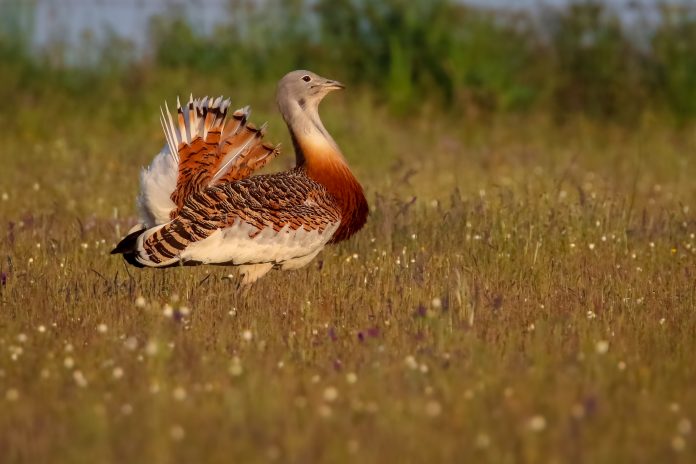Research shows that some of the last remaining habitats for endangered European birds could decrease by 50%, as farmers convert land into more profitable crops
Low intensive agricultural practices have created semi-natural agro-steppes that hold important populations of great bustards, lesser kestrels, rollers and other European endangered bird species. However a new study has shown that these habitats could be at risk due to farmers converting their land to meet increased demand for products such as olive oil and wine.
In the early 2000s several of these agro-steppe sites were designated as Special Protection Areas (SPAs) for bird conservation and are part of the EU Natura 2000 network of priority areas for conservation.
Researchers at the University of East Anglia (UEA) and University of Lisbon assessed the effectiveness of Natura 2000 at conserving Western Europe’s agro-steppes over a 10-year period. The regions in Iberia were studied as they hold approximately a third (14-15,000) of the world’s population of great bustards.
What are agro-steppes?
The cultivation of cereal in a low-intensity rotating system is what characterises agro-steppes. However, these areas are being increasingly converted to permanent and irrigated crops, dramatically changing the open landscapes that provides resources for important bird populations.
Traditional olive groves and vineyards are occasionally used for feeding or resting by several endangered European birds, but the modern versions of these and other permanent crops involve intensively managed practices and are inadequate for such birds.
If the current market pressure on agro-steppe habitat conversion is maintained, the habitats may decline 20% by 2050 and 40% by 2110. Declines will be more severe if the demand for products derived from permanent or irrigated crops continues to increase. Agro-steppes within SPAs may soon be the only areas left to be converted.
The research suggests the Natura 2000 network may have helped prevent losses of approximately 36,000 hectares of agro-steppe habitat in Iberia. However, of the 21 SPAs surveyed in Spain and Portugal, agro-steppe areas experienced losses occurred across all sites.
Losses were 45% lower inside Natura 2000 compared to non-protected areas, although Natura 2000 sites still lost over 35,000 hectares of agro-steppe habitat in 10 years (an area that could support many endangered European birds, including over 500 great bustards).
João Gameiro, a PhD student at the University of Lisbon, led the study, which used aerial imagery to classify how agro-steppes have changed from 2004 to 2015. He said: “The Natura 2000 network is the centrepiece of Europe’s biodiversity conservation strategy and has enabled an important comeback of a very diverse range of mammals and birds, including the great bustard and the lesser kestrel.
“However, it is important to consider why losses occurred even within these protected sites. This will compromise the positive outcomes of past conservation efforts and, at the current rate of habitat conversion, agro-steppes could be reduced to 50% of the present area during the next century.”
Working towards a solution
The researchers suggest that weak enforcement of the restrictions imposed by the protected area network and insufficient incentives to warrant the co-operation of farmers are likely to affect the success of Natura 2000 in the protecting other key habitats throughout Europe.
They also warn that the conversion of farmland outside protected sites may cause the remaining protected agro-steppes to become isolated ‘islands’, with low population connectivity. Habitat connectivity is key for improving populations of endangered European birds, which is also significant in light of climate change.
In agro-steppes farmers may have to diversify their economic activities to remain economically viable, a process that should be funded by agro-environment financial methods.
The study can be found here.











